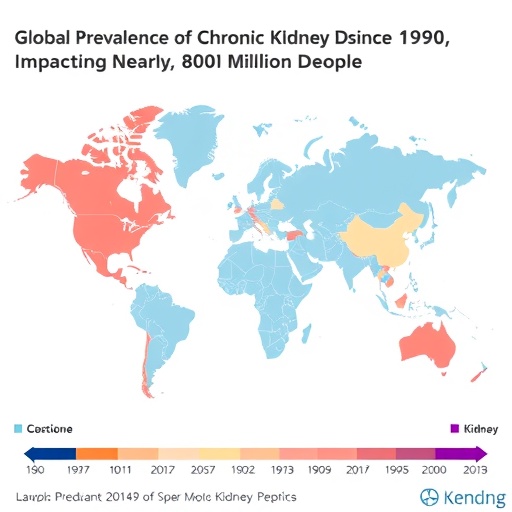In a groundbreaking study published in The Lancet on November 7, 2025, researchers have illuminated the staggering global burden of chronic kidney disease (CKD), revealing that its prevalence worldwide has more than doubled since 1990. Now affecting nearly 800 million adults globally, CKD emerges as a formidable and growing health crisis that demands urgent attention from the medical community and policymakers alike. This extensive analysis draws from the Global Burden of Disease (GBD) 2023 study, encompassing data sets from over 2,200 sources across 204 countries and territories, and offers an unparalleled view of CKD’s lethal and debilitating impact on global health.
Chronic kidney disease, often overshadowed by more widely discussed ailments, now ranks as the ninth-leading cause of death globally, responsible for approximately 1.5 million fatalities in 2023 alone. Unlike other prominent causes of mortality, CKD is uniquely characterized by a persistent increase in age-standardized mortality rates over the past three decades, rising from 24.9 per 100,000 individuals in 1990 to 26.5 per 100,000 in 2023. This alarming trend highlights CKD as one of the few major diseases whose death toll continues to climb, underscoring the failure of current health interventions and the urgent necessity to innovate preventive and therapeutic strategies.
The demographic distribution of CKD reveals a concentration in populous nations, with China and India collectively accounting for nearly 300 million cases. However, this epidemic is far from contained within these borders. Several countries, including the United States, Indonesia, Japan, Brazil, Russia, and Mexico, report more than 10 million affected adults each. CKD’s widespread presence in regions with varying levels of development underscores the universality of risk factors and the global nature of the disease burden, accentuating the challenge of equitable healthcare access and disease management.
A critical dimension of CKD’s impact is its intricate link to cardiovascular disease. Kidney dysfunction, a hallmark of CKD, accounted for nearly 12% of cardiovascular mortalities worldwide in 2023, positioning it as the seventh most significant risk factor for heart-related deaths, surpassing diabetes and obesity. This interrelation between renal impairment and cardiovascular pathology reflects the multifaceted ways CKD exacerbates systemic health deterioration and amplifies morbidity beyond renal-specific complications.
At the heart of CKD’s rise are well-established risk factors such as diabetes, hypertension, and obesity. These conditions synergistically accelerate renal damage through mechanisms including hyperglycemia-induced oxidative stress, persistent elevated blood pressure inducing glomerular injury, and adiposity-related inflammation. Furthermore, dietary habits characterized by low fruit and vegetable intake coupled with excessive sodium consumption substantially contribute to disease progression, illustrating the critical role of modifiable lifestyle factors in CKD pathogenesis.
The study delineates fourteen distinct risk factors influencing CKD prevalence and progression, reinforcing the complexity of its etiology. Among these, metabolic disorders dominate, but environmental exposures and sociodemographic variables also play substantive roles. This multifactorial causation demands a comprehensive, systems-level approach to both research and public health intervention, integrating clinical management with social determinants of health to curb the disease burden effectively.
Regions exhibiting the highest CKD prevalence—North Africa and the Middle East, South Asia, Sub-Saharan Africa, and Latin America—also contend with pronounced healthcare disparities. Countries such as Iran, Nigeria, Haiti, and Mexico report prevalence rates exceeding 15%, illustrative of an urgent need for targeted screening and affordable treatment programs. The early stages of CKD predominate among diagnosed individuals, offering a critical window for intervention that could significantly attenuate progression to end-stage renal disease.
Despite the profound burden, access to effective kidney replacement therapies—including dialysis and transplantation—remains critically limited and inequitable worldwide. This disparity exacerbates outcomes for patients in resource-poor settings, where the high cost and infrastructural demands of advanced therapies preclude widespread availability. Consequently, emphasis must shift to early detection, risk factor modification, and innovative, scalable treatments to reduce reliance on costly kidney replacement interventions.
Public health strategies focusing on prevention could reshape the trajectory of CKD globally. Screening programs enabling timely identification of early-stage disease, combined with aggressive management of hypertension and diabetes, hold promise to delay or prevent progression to advanced CKD. Pharmaceutical advancements that refine glycemic control and antihypertensive efficacy will be pivotal, as well as initiatives promoting dietary improvements and lifestyle modifications at the population level.
The socioeconomic implications of CKD’s rise are profound, impacting not only individual patients but also families, communities, and healthcare systems. Hospitalizations, missed workdays, and long-term care requirements manifest as substantial economic burdens. Policymakers must integrate CKD within the broader framework of non-communicable disease (NCD) control, recognizing its growing influence on premature mortality and disability-adjusted life years (DALYs).
Researchers emphasize that despite CKD’s significant contribution to global health loss—and its role as a catalyst for cardiovascular mortality—it remains underrepresented in health policy agendas. This oversight is especially concerning in low- and middle-income countries, where the disease’s burden overlaps with existing health inequities. Bridging this gap will require concerted global action, resource allocation, and enhanced public awareness to elevate CKD within the hierarchy of public health priorities.
The findings of this study serve as a clarion call to the global medical community to intensify efforts in combating the CKD epidemic. By fostering collaboration across epidemiology, nephrology, nutrition science, and public health, and by harnessing data-driven insights exemplified in this comprehensive analysis, it is possible to envision a future where CKD’s relentless rise is curtailed, and millions of lives are preserved worldwide.
Subject of Research: Chronic Kidney Disease (CKD)
Article Title: Chronic kidney disease has more than doubled since 1990, now affecting nearly 800 million people worldwide
News Publication Date: 7-Nov-2025
Web References: https://www.thelancet.com/journals/lancet/article/PIIS0140-6736(25)01853-7/fulltext
References: 10.1016/S0140-6736(25)01853-7
Keywords: Kidney, Chronic Kidney Disease, Renal Failure, Nephropathies, Disease Incidence, Health Care, Health Disparity, Health Care Delivery, Human Health, Public Health




